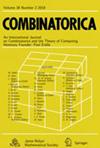循环群中Fuglede猜想的群环逼近
IF 1
2区 数学
Q1 MATHEMATICS
引用次数: 2
摘要
Fuglede猜想指出,一个具有正有限勒贝格测度的子集\(\Omega \subseteq \mathbb {R}^{n}\)当且仅当它平移到\(\mathbb {R}^{n}\)是谱集。然而,对于\(\mathbb {R}^n\), \(n\ge 3\),这个猜想并不在两个方向上都成立。虽然这个猜想在\(\mathbb {R}\)和\(\mathbb {R}^2\)中仍未得到解决,但在\(\mathbb {R}\)中的研究中,环群是有用的。本文介绍了一种研究循环群中的谱集的新工具,特别证明了Fuglede猜想在\(\mathbb {Z}_{p^{n}qr}\)中成立。本文章由计算机程序翻译,如有差异,请以英文原文为准。
A Group Ring Approach to Fuglede’s Conjecture in Cyclic Groups
Fuglede’s conjecture states that a subset \(\Omega \subseteq \mathbb {R}^{n}\) with positive and finite Lebesgue measure is a spectral set if and only if it tiles \(\mathbb {R}^{n}\) by translation. However, this conjecture does not hold in both directions for \(\mathbb {R}^n\), \(n\ge 3\). While the conjecture remains unsolved in \(\mathbb {R}\) and \(\mathbb {R}^2\), cyclic groups are instrumental in its study within \(\mathbb {R}\). This paper introduces a new tool to study spectral sets in cyclic groups and, in particular, proves that Fuglede’s conjecture holds in \(\mathbb {Z}_{p^{n}qr}\).
求助全文
通过发布文献求助,成功后即可免费获取论文全文。
去求助
来源期刊

Combinatorica
数学-数学
CiteScore
1.90
自引率
0.00%
发文量
45
审稿时长
>12 weeks
期刊介绍:
COMBINATORICA publishes research papers in English in a variety of areas of combinatorics and the theory of computing, with particular emphasis on general techniques and unifying principles. Typical but not exclusive topics covered by COMBINATORICA are
- Combinatorial structures (graphs, hypergraphs, matroids, designs, permutation groups).
- Combinatorial optimization.
- Combinatorial aspects of geometry and number theory.
- Algorithms in combinatorics and related fields.
- Computational complexity theory.
- Randomization and explicit construction in combinatorics and algorithms.
 求助内容:
求助内容: 应助结果提醒方式:
应助结果提醒方式:


